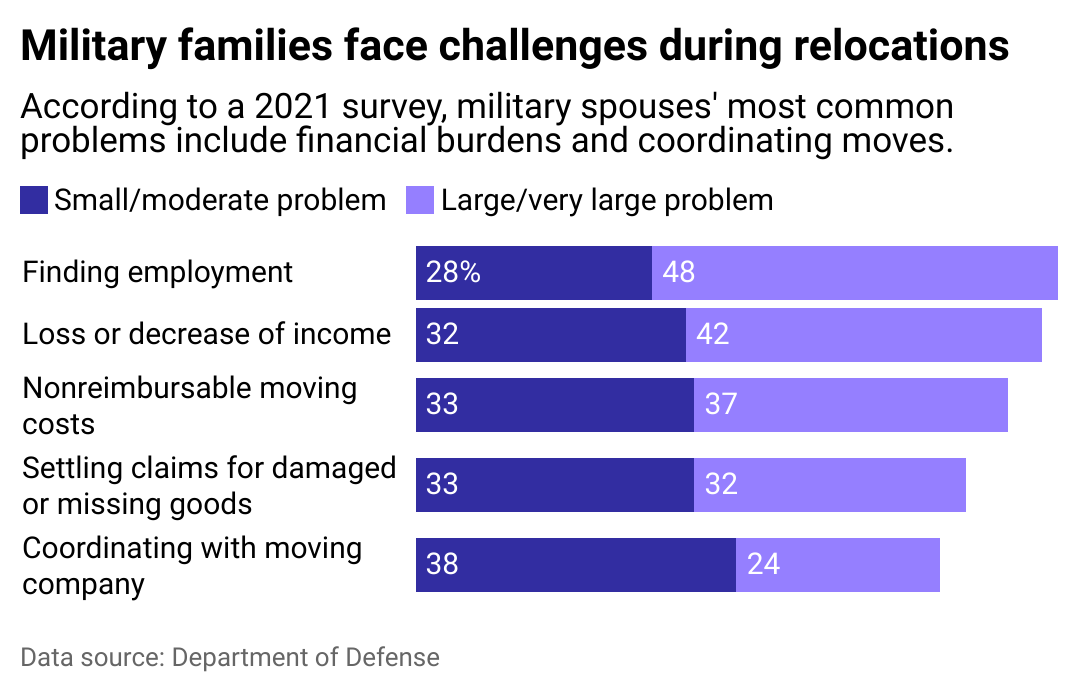Most military spouses have relocated at least once—here are their most common challenges

LightField Studios // Shutterstock
Most military spouses have relocated at least once—here are their most common challenges
A man in camo and a young girl moving boxes into a house.
Military families face many distinct challenges, from the inherent stress of a high-risk occupation to long-term separations from loved ones that occur during active duty. As anyone who has been through boot camp knows, enlistment in the military isn’t just a job—it’s a way of life.
Mobility is a major feature of military life, and everyone must learn how to adapt to sudden moves and changes. The most dramatic example is deployment, the movement of armed forces to support a mission, which may or may not be combat-related. Less dramatic and more frequent are permanent change of station orders, which require a family to move from one location to another, including overseas, for the serviceperson’s new assignment.
PCS moves come with many challenges. Logistically, military members and their families must physically move belongings to new apartments or homes on base, in military housing, or in rentals or new purchases that are often secured sight-unseen. Families also bear the emotional labor of starting over in an unknown place, navigating new schools, new jobs (a process that can take at least seven months after a relocation), and new friends—often without the support of extended family or other connections beyond the military. These transitions can be particularly difficult for military spouses.
CitizenShipper examined data from the Defense Department’s Active Duty Spouse Survey to see the most common hurdles military spouses face when their partner is assigned to a different location. The results are based on responses from more than 11,500 military spouses and are weighted to the population. Survey results were gathered in 2021 and released in 2023 (last updated in March 2024).
Generally, military families move every two to three years due to PCS orders. The Defense Department provides many resources to help, from tools for the actual physical move to assistance in dealing with the many stresses of relocation after arrival.
Keep reading to learn more about common challenges military spouses face after relocation.
![]()

CitizenShipper
Finding jobs represents the biggest challenge for military spouses
A bar chart listing the biggest challenges for military families during relocation. Finding employment is the most common challenge.
In a new place with no professional network, finding employment can be hard: Unemployment after a relocation causes high levels of stress, anxiety, and depression in military spouses, according to a 2017 Department of Defense survey (released in 2019) of 600,000 military spouses.
The loss of income from an unemployed military spouse can also cause a considerable financial burden—a problem only heightened by the expenses of moving itself. If there are children involved, finding work also means finding child care. The actual process of moving is also stressful, including coordinating with a moving company before, during, and after the move and occasionally filing and settling claims for lost or damaged items.
President Joe Biden in 2023 issued an executive order that directly addresses spousal employment challenges. It features overall pay increases for service members, programs developed to reduce the cost of child care, and support for spouses seeking jobs—all of which can help ease the burden of PCS moves on military families.
Story editing by Nicole Caldwell. Copy editing by Tim Bruns.
This story originally appeared on CitizenShipper and was produced and
distributed in partnership with Stacker Studio.